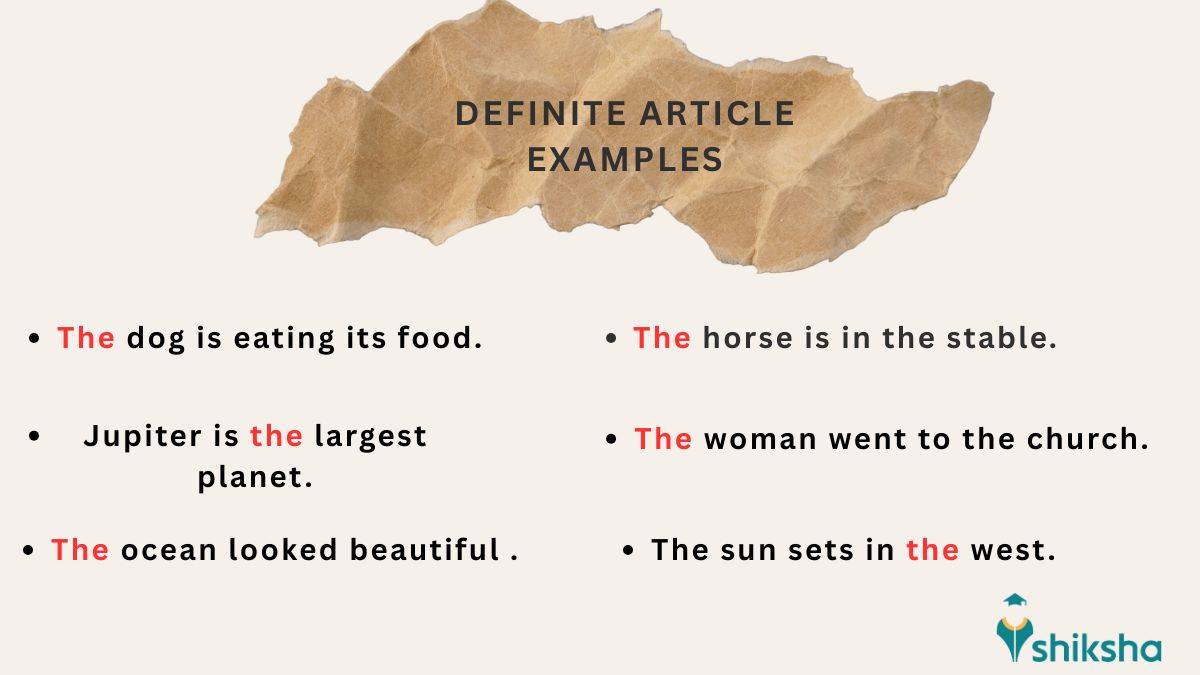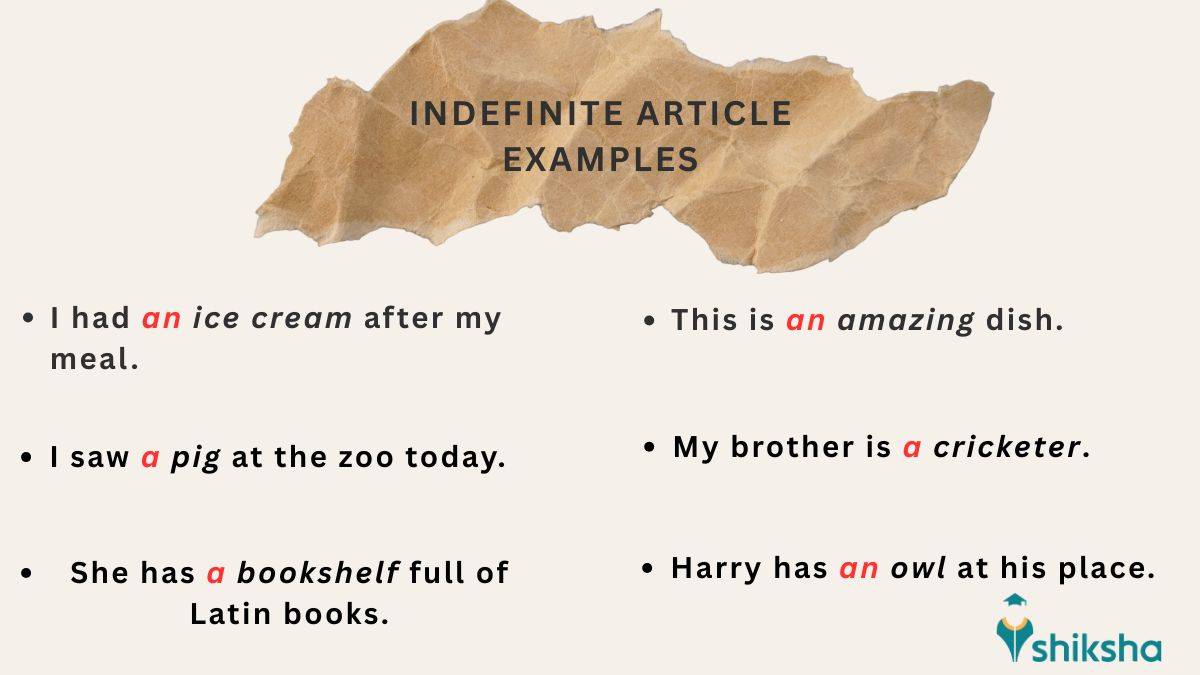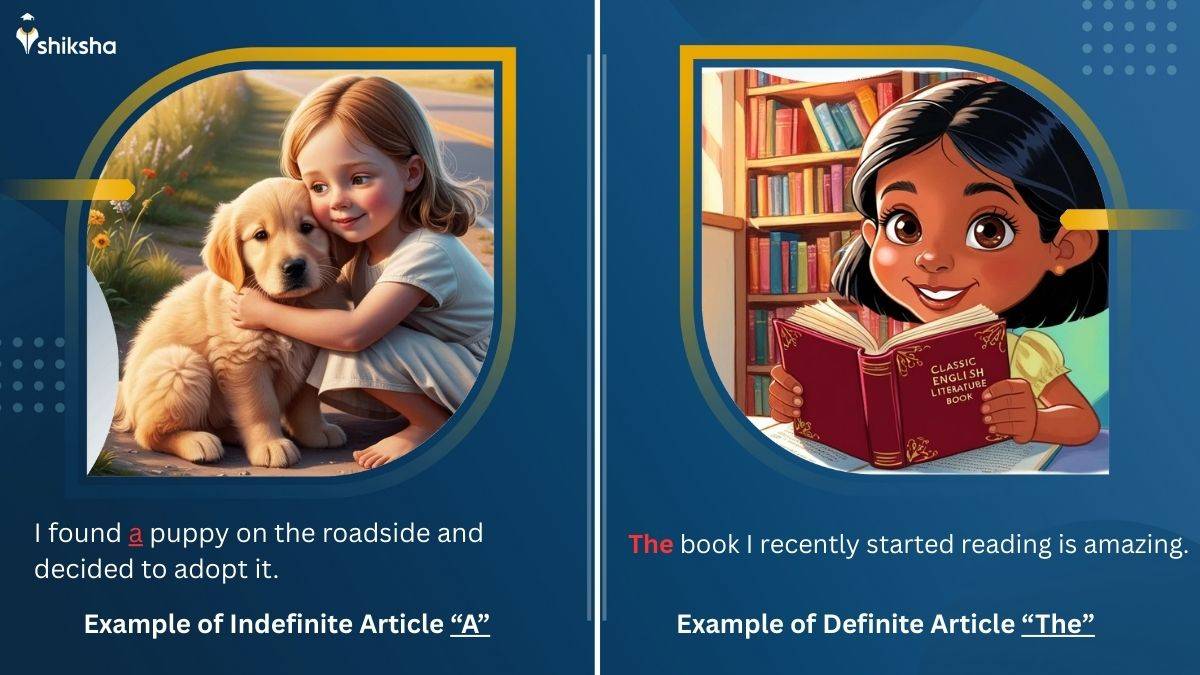
One of the most basic and important components of English grammar is Articles. There are two types of Articles; “a/ an” and “the”. Perhaps one of the most commonly used components of English grammar, articles are considered “Parts of Speech”. In addition to grammar usage, these are also used in order to establish a cohesive flow of sentences, whether in written or spoken English.
If you’re looking to learn more about Articles, common grammar mistakes while using them, and tips to improve your grammar, then the following article is for you. By the end of this article, you'll get a better understanding about the following concepts:
- What are articles?
- Article definition
- Use of articles
- Rules of articles
- Types of articles
What are articles in English?
In English grammar, articles are words to come before a noun and indicate whether the noun is specific or general. The definite article (the) is used while talking about a specific noun. Whereas, indefinite articles (a, an) are used for general nouns or a noun whose indentity remains unknown.
What are ten examples of articles?
Find below ten examples of articles:
- I saw a cat in the balcony.
- She wants to buy a house.
- Can I have a bottle of juice, please?
- He is an engineering at some big tech firm.
- We had an antique vase in our living room.
- I had an icecream for dinner.
- The sun rises in the east.
- She went to the store by the ocean.
- The weather is gloomy today.
- She was a quiet girl, sitting under an umbrella by the beach.
- What are Articles?
- Definition of Article in English Language
- Types of Articles
- Articles in English Grammar: Special Cases and Exceptions
- Omission of Articles
- Preparation Tips to Master English Articles
- Best Books to Prepare for Articles in English Grammar
- Examples of Articles
- Practice Questions for Articles with Answers
- Related English Grammar Topics for Preparation
- Frequently Asked Questions (FAQs) on Articles in English Grammar
What are Articles?
In English grammar, articles are words ("a," "an," and "the") that precede nouns to indicate whether the noun is specific or general. Articles can hence, be labelled as adjectives as well. In the following sections, students can learn in-depth about Articles, their various types, exceptions, common mistakes, and examples. But before we begin, let’s look at three examples for each of the articles listed above:
- An apple a day is certainly not enough.
- This is the dish everyone’s gushing about.
- I’m just a mile away from the destination.
Definition of Article in English Language
As per the Collins Dictionary, “In grammar, an article is a kind of determiner. In English, 'a' and 'an' are called the indefinite article, and 'the' is called the definite article.”
Additionally, as per the Oxford Dictionary, articles are defined as “(grammar) the words a and an (the indefinite article) or the (the definite article)”.
Word Origin: Middle English (denoting a separate clause of the Apostles' Creed, a formal statement of Christian beliefs): from Old French, from Latin articulus ‘small connecting part’, diminutive of artus ‘joint’.
Pronunciation of Article: "aa·ti·kl"
Also Read:
| Definition of Future Tense |
Types of Articles
There are two types of Articles in the English grammar. These are “Definite” and “Indefinite”. Further bifurcating them, we can understand both types as follows:
Definite Articles
Amongst the three articles mentioned above, “the” is considered a definite article and is used to refer to a specific or one that is already known or mentioned. In other words, it is used when the speaker and listener already know about the specific noun which is being referred to. Additionally, it is also used before plural nouns or to indicate the superlative degree of comparison. To understand this better, students can take a look at the following examples:
- “The dog wagged its tail while looking at me.”
- “The boy over there is waving at me.”
- “Sahar won the painting contest.”
- “The sun rises in the east.”
- “This is the sweetest dish I’ve ever had.”
Note: We also use definite articles in front of countries which contain words, such as Kingdom, Republic, States, etc. For example, The Republic of Korea, The United Kingdom, The United States of America, etc.
You can look at the flowchart below to learn about the usage of Definite articles in a sentence:
The other type of article is indefinite i.e., “a/an” is used when referring to a general or non-specific term. Unlike the definite article, they don’t point at any particular or specific noun. Instead, the indefinite articles are used to denote the non-specific. When one uses indefinite articles, they are referring to something one of a kind. But, it is not something that the listener knows of.
Ever wondered when to use a/ an? The indefinite article “a” is used before words that begin with a consonant sound. Meanwhile, “an” is used before words that start with a vowel sound. The below-mentioned examples list some examples for indefinite articles:
- “This is an amazing outfit.”
- “This is an oil-free moisturiser.”
- “I saw an elephant in the jungle today.”
- “She has a nice set of crockery.”
You can check out the following images to learn about the usage of Indefinite articles in a sentence:
Articles in English Grammar: Special Cases and Exceptions
Now that we have gotten a bit of understanding regarding the articles and their usage, it is time to learn about the special cases and exceptions while applying articles. Although, it may sound simple since the general statement for indefinite articles implies that words starting with consonant sounds use “a” in front, while “an” is used for vowel sounds, however, there are certain exceptions. The same exception is also followed when using an acronym or initials.
Exception #1: Words Starting with a Silent Letter
These exceptions are seen when dealing with words that have a silent letter at the beginning or the start of the word that sounds different than how it is spelt. The following examples can offer better insight about this rule:
Example 1: An hour has passed since I last saw him.
Here the word “hour” begins with the sound of “O”, thus making a vowel sound. Hence, ‘an’ is used before it.
Example 2: A kingdom without an heir is prone to attacks from the enemy.
The word “heir” is pronounced similarly to air, thus making a vowel sound although the letter ‘H’ is a consonant.
Example 3: Mr. Kim needs a unit of blood for his surgery.
In this example, ‘a’ is used instead of ‘an’ in front of the word “unit”. This is because unit is pronounced as yoo-nit, making the first letter sound like a consonant.
Example 4: Rohan recently purchased an X-Ray machine for his hospital.
While saying X-Ray, we pronounce it as ‘ex-ray’. Hence, in the above-mentioned example, ‘an’ is used in front of the word.
Exception #2: Acronyms
To decide whether ‘a’ or ‘an’ needs to be used while pronouncing certain acronyms or initials, pay attention to how the first letter sounds while speaking.
Example 1: I’m currently pursuing an MCom degree from Delhi University.
In this sentence, MCom is pronounced as ‘em-com’ which starts with a vowel sound, hence, ‘an’ is used.
Example 2: This was a once in a lifetime opportunity for me.
In the above sentence, the word once is pronounced as ‘vuhns’, thus making it a consonant sound.
Omission of Articles
Now that we’ve discussed the usage of articles in English grammar, it’s time to learn about when to omit articles in English sentences. There are certain words in front of which articles are generally omitted. In total, there are about ten such scenarios where we do not use any article in front of certain words. These exceptions are as follows:
- When talking about abstract nouns (uncountable nouns) used in a generic sense:
Example 1: Love wins over everything.
Example 2: Freedom of speech is a fundamental right.
Example 3: Patience is the key to success.
- Before plural nouns used in a general sense:
Example 1: She likes sweets.
Example 2: There are books everywhere in my home.
- In front of most of the proper nouns, such as names, places, countries, continents, etc.
Example 1: Govind is looking rather pale today.
Example 2: Europe is a beautiful place to visit.
- Before the name of the meals
Example 1: What are we having for lunch today?
Example 2: I’m going out for dinner.
Note: If there’s an adjective before meals, we use “a/an”. Eg.: I had an early lunch today.
“The” is used when specifying the meal, Eg.: The breakfast we had back in Goa was delicious.
Preparation Tips to Master English Articles
To master how and when to use articles in English grammar, practising consistently is essential. The first step is to understand the rules and exceptions as mentioned above. Once you understand the logic behind the usage of definite and indefinite articles, it’ll become fairly easy to identify which article needs to be used and when. For better understanding, you can try solving practice papers and grammar exercises which will ultimately help you understand the rules better.
Here’s how you can improve your English grammar:
- Read as Much as Possible and Observe When Articles are Used in a Sentence
Reading a variety of books and other literary items is certainly a helpful guide in improving overall grammar learning. The more one reads, the more exposed one becomes to various sentences, including usage of grammar in the same. Over the course of continuous reading, one can start picking up the common rules and usage of Articles in English grammar. Not only does reading improve your grammar, it’ll also aid you in widening your vocabulary and knowledge.
- Learn the Rules and Exceptions for Articles in English Grammar
Although it is relatively easy to learn how and when to use articles in an English sentence, learning the rules and exceptions provides added benefits. Not only will learning the rules aid in know-how, but also come in handy in case of entrance tests, if a specific question related to the rules is asked.
- Play Grammar Quizzes to Master the Usage of Articles in English Grammar
Applying the rules can be quite tricky if not understood properly. It can also be somewhat confusing. In such cases, playing grammar quizzes can be a quick and fun way to practice the usage of articles in English grammar. There are a variety of online quizzes which are fun and helpful. Alternatively, you can also play such games with your friends to simultaneously have fun and improve your knowledge.
Best Books to Prepare for Articles in English Grammar
Reading books can help one improve not only their reading abilities but also basic grammar, including how to use articles in sentences. Some of the books that might be of help to master articles in English are as follows:
| Book |
Author/ Publication |
|---|---|
| Practical English Usage |
Michael Swan |
| Mastering A, An, The: English Articles Solved |
Douglas Porter |
| English Grammar and Composition |
S.C Gupta |
| The Article Book: Practice Toward Mastering A, An, The |
Tom Cole |
You can find a variety of other such books in offline markets, online PDFs, and more.
Also Read:
Examples of Articles
Practice Questions for Articles with Answers
Related English Grammar Topics for Preparation
Frequently Asked Questions (FAQs) on Articles in English Grammar
Commonly asked questions
When to use a/ an in English sentences?
In a very basic sense, 'a' is used as a prefix to words that start with a consonant, while 'an' is used for vowels.
- Example: He lives only a mile away from the office.
- Example: An eye for an eye will make the whole world blind.
This rule also applies when a word starts with a consonant/ vowel sound, such as an hour, a university, etc. This stands true to acronyms as well, for example, a UFO, an HR department, etc.
How many types of articles are there in English Grammar?
In English grammar, there are two types of articles; Definite and Indefinite. The two types include three articles i.e., A/ AN and The. While 'the' is termed a definite article, 'a' and 'an' are called indefinite articles. Some examples for both cases can be seen below:
- He is such a sweet baby.
- She has the voice of an angel when she sings.
- The moon looks especially beautiful today.
What are articles in English grammar?
In English grammar, articles are words ("a," "an," and "the") that are prefixes to nouns and are used to indicate whether the noun is specific or general. As these are used before speaking about the noun, articles can also be considered as adjectives to a certain degree. There are two types of articles; Definite and Indefinite.
When do we omit articles?
There are certain cases in which articles are generally omitted. In total, there are about ten such scenarios where we do not use any article in front of certain words. Some of these exceptions are as follows:
- When talking about abstract nouns (uncountable nouns) used in a generic sense
- Before plural nouns used in a general sense
- In front of most of the proper nouns, such as names, places, countries, continents, etc.
- Before the name of meals.
English Articles Exam
Student Forum
Other Topics under this Chapter
Other Class 10th English Chapters
- English Past Tense
- English Idioms
- English Punctuation
- English Analogy
- English Interjections
- English Prefixes
- English Adjectives
- English Future Continuous Tense
- English Letter Writing
- English Suffix
- English Grammar
- English One Word Substitution
- English Mood
- English Direct and Indirect Speech
- English Figures of Speech
- English Composition
- English Para Jumbles
- English Reading Comprehension
- English Sentences
- English Auxiliary and Modal Verbs
- English Formation of Words
- English Precis Writing
- English Nouns
- English Adverbs
- Conjunctions
- English Prepositions
- English Verbs
- English Paraphrasing
- English Articles
- English Subject and Predicate
- English Pronouns
- English Tenses
- English Active and Passive Voice
- English Vocabulary
- English Subject Verb Agreement
- English Phrases
- English Synonyms
- English Etymology and Roots
- English Spelling Rules
- English Parts of Speech
- English Gerunds



